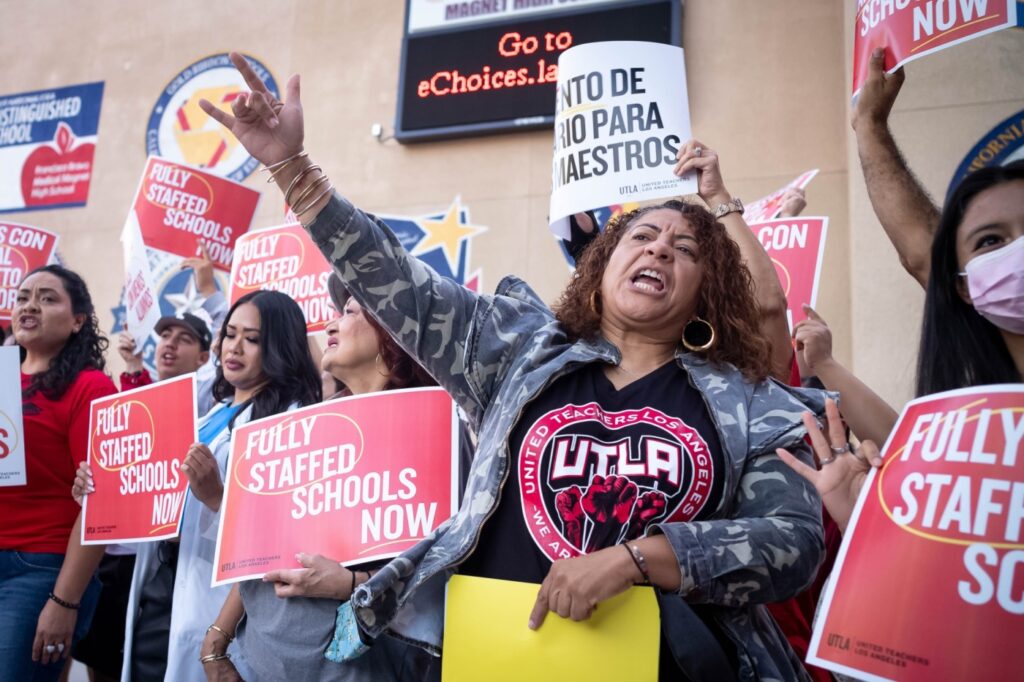
“This is our opportunity to elect our own bosses,” proclaimed Local Chapter 224 of the California School Employees Association on its website in 2010, when it backed Measure H for Capistrano Unified School District. The measure passed with 65% of the vote and changed trustee representation from at-large to districts.
For an editorial in the Orange County Register at the time, I called Chapter 224 head Ronda Walen, who wrote the above statement on the union website. I asked if it was fair for the union to elect “our own bosses.”
“Yes, I think it is,” she replied. “In a democracy, we have the right to do that.”
Actually, using the voters’ own tax money to push candidates and positions on them is a violation of democracy, which is rule by the people — all of them. Not just a few union bosses living off taxes forcibly taken from everybody else, and funding pro-union campaigns with those same taxes.
This actually is a pervasive and continuing belief among California’s unions.
A similar quote was cited in a 2021 Register article by Will Swaim, president of the California Policy Center.
Alex Caputo-Pearl, currently the vice president of the United Teachers of Los Angeles, said to a meeting of his union, “We have a unique power — we elect our bosses. It would be difficult to think of workers anywhere else who elect their bosses. We do. We must take advantage of it. … If we win, they will decide how the hundreds of millions of dollars in additional money is used. They will be across the bargaining table from us in our huge full contract negotiations in 2022.”
Swaim’s 2021 column, incidentally, was attacking the massive smear campaign being waged at the time by the Association of Orange County Deputy Sheriffs union against the bid for OC supervisor by former state Sen. John Moorlach. I saw that personally as I was working on that campaign. And I saw it the previous fall when the AOCDS and other unions, most notably the prison guard union, ran similar smears against this moral man in his re-election campaign for state Senate.
The unions — using our tax money against us — were shameless in their assaults with disgusting social media ads and mail flyers.
“The definition of corruption is, when you take something that’s supposed to mean one thing and you do something else,” Ed Ring told me; he’s a political writer and co-founder of the CPC. “I think union spending on political campaigns corrupts the meaning of representative government. We’re supposed to have government of the people, but what we’ve got is government of the public-employee unions. They back candidates with their contributions. Which means they’re essentially electing their own bosses using the taxpayers’ money.”
He said that’s not a problem with private-sector unions, which have restraints on their action, such as bankrupting a private company if demands are too high. In the private sector, too, there are alternatives. If the UAW strikes at GM, you still can buy a Toyota. But the public-sector unions’ strikes can shut down even essential government services, for which there is no alternative.
“The unions have a permanent presence, whereas politicians come and go, which gives them a lot of power,” he said. “They can target candidates, and they do it all the time.”
An example right now is in Santa Ana. The Police Officers Association, headed by President Gerry Serrano, is circulating petitions to recall councilmembers Jessie Lopez and Thai Viet Phan for bucking extravagant union demands for pay increases. Said Lopez, “Mr. Serrano refuses to be logical, and he has made it very clear that he is looking to have a council that will do whatever he wants at whatever costs he wants.” The threat is real. In 2020, the union succeeded in recalling Councilmember Ceci Iglesias for the same reason.
What can be done, given the unions’ lock-grip on the political process? Fortunately, in 2018 the U.S. Supreme Court handed down the Janus v. AFSCME decision, allowing non-union public employees to opt out of paying union fees and dues.
Related Articles
The U.S. must coordinate with Israel in order to contain Iran
Jon Coupal: There’s election fraud and then there’s election fraud
Biden offers his expensive vision to nation
Oil company profits and the ‘invisible hand’ of the market
Capitol community mourns two veterans of California politics
Ring said the unions have “used a lot of work-arounds to make it harder for public employees to opt out. They’ve thrown a lot of bureaucratic obstacles. But there has been a decline in public-sector representation” of 27.1% currently opting out. (However, as the number of public employees has increased greatly in California, the raw number of those actually paying dues has increased.)
The CPC’s website, CaliforniaPolicyCenter.org, includes a section to help employees opt out of paying the union dues, as well as obtain alternatives to such union-provided services as insurance. Under “Projects,” click on “Union Membership Rights.”
Let’s aim for making the opt-out rate 100%.
John Seiler is on the SCNG editorial board.
